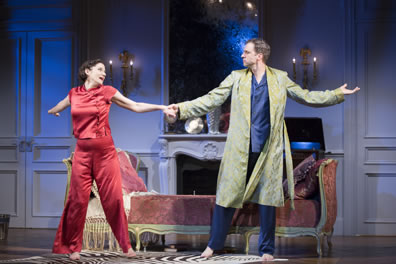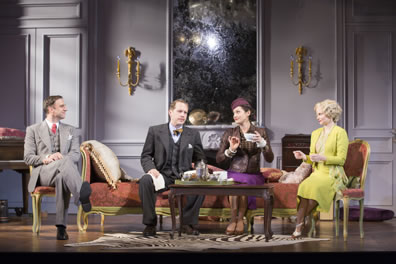Private Lives
A Slice of Lives
By Noël Coward
Shakespeare Theatre Company, Lansburgh Theatre, Washington, D.C.
Wednesday, June 11, 2014, G–106&107 (center orchestra)
Directed by Maria Aitken

A moment of bliss between the battles, Amanda (Bianca Amato) and Elyot (James Waterston) dance in her Paris apartment after they've abandoned their newlywed spouses in Noël Coward's Private Lives at the Shakespeare Theatre Company's Lansburgh Theatre. Photo by Scott Suchman, Shakespeare Theatre Company.
It's been 14 hours and six days since we saw Noël Coward's Private Lives at the Shakespeare Theatre Company, and all this time I've come up with nothing much I can say about it. I sit here, now, in front of my computer, bereft of inspiration yet feeling obligated to write and post something about this play and production. So, I figure nothing is as good a place to start as any.
This is not to denigrate the play, necessarily, nor the production, certainly. We laughed, a lot. I found myself invested in and caring about these characters—at least up until the last scene, by which time I grew bored and then irritated with them, like party guests whose self-absorption has grown tiresome. The acting is exemplary, especially in the central performances of Bianca Amato and James Waterston who slip fully into the roles of, respectively, Amanda and Elyot. Ably playing second fiddles are Autumn Hurlbert turning in a slyly comic performance as Sibyl and Jeremy Webb playing the all-bluster Victor, and I might as well give a shout-out to the little-more-than-cameo appearance of Jane Ridley as the French-speaking maid Louise. All of these actors display stopwatch-precision timing with their lines and reactions (even the pauses are perfectly timed) and give incredibly nuanced readings. When Elyot says Sibyl is from Norfolk, Amanda who is ostensibly Sibyl's rival replies, "Very flat, Norfolk": three words—five syllables—glistening in multifaceted meanings in Amato's delivery.
It should not be surprising that the actors are so adept with this script. Maria Aitken, who boasts the unique credential of having starred in more of Coward's leading roles than any other actress and is also a trustee of the Noël Coward Foundation, directs this clip-paced, sure-handed production. Detailed set designs of the French coast hotel balcony and a Paris apartment are by Allen Moyer, and the authentic 1929, fashion-of-the-wealthy costumes are by Candice Donnelly. The whole thing was originally produced in 2012 at the Huntington Theatre Company in Boston, Mass., and transplanted with reunited cast to the STC's Lansburgh Theatre in Washington, D.C., this spring. Thus, the actors, as with Amanda and Elyot, spent many an evening inside their characters and then some time apart, during which time absence makes the characters grow richer via evolving impressions of tractable memory.
Beyond these facts, what of my own impressions can I record, without wasting my time or yours just rambling? I'll start, as this website does, with the playwright and this disclaimer: not only have I never seen nor read this play before, this essentially is my first-ever experience with Coward. Not really—according to the "List of Non-Shakespeare Productions" on this website, I saw Blythe Spirit at London's Vaudeville Theatre in April 1986. From that list I can tell you that Peter Farago directed it, Jane Asher played Ruth (the Jane Asher? Yep, according to Wikipedea), and Joanna Lumley played Elvira. But, I have no recollection of the play or production, can't even tell you who Ruth and Elvira are. So, for all practical purposes, I came into Private Lives a Coward virgin.
I know of him, though, know him to be a witty playwright who tended to portray the wealthy class—a mid-20th century version of Lifestyles of the Rich and Famous, a little more fictional, perhaps, and somewhat more meaningful. I always thought of Coward as his generation's Oscar Wilde, and I'm apparently not alone in thinking that because it's mentioned in this production's program notes and Aitken's opinion that she sees no resemblance. "I think there's much more formality in Wilde," she is quoted in an interview by Drew Lichtenberg, STC's literary associate and resident dramaturg. "His characters don't do erotic things, whereas Coward is rooted in something quite visceral." She's an expert, and her opinion is worth noting: she teaches master acting classes on Coward at Yale, New York University, Juilliard, and The Acting Company. To me—and at best I'm only a professional audience member—the difference between the two playwrights is in the degree of satire. Wilde drips, drools, even slobbers in cynicism: you never get the impression that he at all approves of his characters' behaviors or constitutions, even if they do get happy endings.
With Private Lives, I'm not sure Coward is giving us satirical renderings. In fact, I come away feeling he really admires his characters, wants to be them: incessantly wealthy without having to work for it, gallivanting around the world on a whim, and spending days in bed with someone you are not married to and triumphing in that bohemian notion (remember, this play was written in 1929, so this was a revolutionary concept; even John Lennon in 1969 was chastised for spending days in bed with Yoko, and she was his wife). However, as with Shakespeare, it's never a good idea to identify any specific character as the playwright, even though Coward wrote the parts of Elyot and Amanda with himself and Gertrude Lawrence in mind to play them, which they did in London and on Broadway; and as they were actors, it's never a good idea to think a person playing a part really is that character, even if he wrote that part for himself to play.
One thing for sure is that, satire or not, there's real, raw emotion in the opening scene between Elyot and Amanda. Once married and now divorced, both have just begun their honeymoons with new spouses (Sibyl and Victor, respectively) and they happen to have booked adjoining rooms at the hotel. As Sibyl constantly needles Elyot about Amanda, and Victor likewise can't stop talking about Elyot to Amanda, we not only see that Elyot and Amanda still have conflicted feelings for each other, but all this needling is evidence that the one-time lovers had such a grip on each other's psyche that each other's new partners have been caught up in that grip, too.
When Amanda and Elyot realize the other is there, they go to war, first with themselves, then with their new spouses (Elyot and Amanda insist on leaving the hotel that night without proper explanation), and then with each other. In these moments, especially when they finally address each other after their spouses have individually left their rooms in huffs, Waterston's Elyot and Amato's Amanda achingly portray in their expressions, gestures, and postures how the opposing chambers of their hearts are knocking hard against each other. It's such a powerfully written and acted scene, despite its many comic one-liners, that I not only feel for the characters, I resist imagining being placed in their situation. I'm not saying I ever would be put in such a situation with a past lover. Maybe. Probably not—too many decades past. Yet, maybe.
Fortunately, the next scene finds the pajama-clad Amanda and Elyot lounging in the bed of her Paris apartment, where they have escaped after abandoning their oblivious newlywed spouses back at the hotel. Now, this is the kind of fantasy I can get into, but with my wife doing the lounging with me. So, maybe I'm tapping into Coward's psyche, after all.
However, as fun and funny as this scene is, it takes a disturbing turn near its end. Elyot, as played by Waterston, is manic; really, truly, bipolar manic. It becomes scary and less funny the more he displays it, and it is a trait that, coupled with Amanda's self-centered nature, apparently leads to their hot-cold relationship, which degenerates into actual violence. Coward clearly intended all this to be funny, especially his joke (spoken by Elyot) that women should be hit constantly like a gong; but today, it is not funny. Nor is the fact that Amanda is equally aggressive, physically as well as intellectually, a justification or excuse for Elyot's aggression. Today, both would be arrested and slapped with restraining orders.

The moment of truth, for the characters in Noël Coward's Private Lives and for the audience: from left, Elyot (James Waterston), Victor (Jeremy Webb), Amanda (Bianca Amato) and Sibyl (Autumn Hurlbert) discuss over tea Elyot's and Amanda's behavior. Photo by Scott Suchman, Shakespeare Theatre Company.
True, some of the comic behavior and jokes in Shakespeare's plays don't belong in the 21st century, either. And, unfortunately, while the humor is not timeless, the behavior is. Here, Amanda and Elyot not only get away with their behavior, they exalt in it, consider it part of their superiority over Sibyl and Victor. Furthermore, Coward gets in a sly dig at society writ large when the leads' antics end up being revealed as part of the personality makeup of their straight-laced, high-ground moralistic spouses, as well. It's saying, "See, bad behavior is not limited to bohemians."
Maybe the difference between Coward and Shakespeare is not their timelessness but their time. Though Gratiano gets away with his vile behavior toward Shylock in The Merchant of Venice written more than four centuries ago, many directors today find some way to punish him nevertheless (but, come on, the Gratianos of today generally suffer little from their racist remarks, even if they do have to sell their basketball teams for $2 billion; kind of like Antonio's fleets miraculously coming into port). Private Lies, meanwhile, is less than a century old; directors seem unwilling to toy with Coward like they do with Shakespeare—not that toying with either playwright makes him any more or less relevant to the individual or social experience of this day.
And this day is going on seven days since I saw this play.
Eric Minton
June 18, 2014
Comment: e-mail editorial@shakespeareances.com
Start a discussion in the Bardroom



 Find additional Shakespeareances
Find additional Shakespeareances